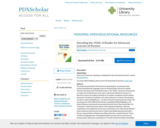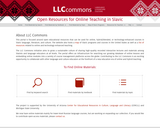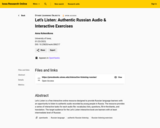
A Play written by Chasidah Fried Copyright 2020.Please see the attachment.
- Subject:
- Arts and Humanities
- Reading Literature
- Material Type:
- Reading
- Author:
- Chasidah Fried
- Date Added:
- 01/30/2023

A Play written by Chasidah Fried Copyright 2020.Please see the attachment.

The materials presented in this book were developed for an advanced-level content-based Russian language course at Portland State University entitled “Russian Literature of the Twentieth Century: The 1920s.” Literature of this period is a major part of the Russian canon, but is notoriously difficult for learners of Russian to read in the original, due both to its stylistic complexity and the relative obscurity of its historical, political, and cultural references. And yet, this decade is crucial for understanding Russia – not only in the Soviet period, but also today. This was the period, when Mikhail Zoshchenko, Isaak Babel, Mikhail Bulgakov, and Andrei Platonov meticulously documented the birth of the “New Soviet Man,” his “newspeak” and Soviet bureaucratese; when Alexandra Kollontai, a Marxist revolutionary and a diplomat, wrote essays and fiction on the “New Soviet Woman”; when numerous satirical works were created; when Babel experimented with a literary representation of dialects (e.g.,Odessa Russian or Jewish Russian). These varieties of language have not disappeared. Bureaucrats still use some form of bureaucratese. Numerous contemporary TV shows imitate the dialects that Babel described. Moreover, Bulgakov’s “Heart of a Dog” gave rise, due largely to its film adaptation, to catch-phrases that still appear throughout contemporary Russian media, satirical contexts, and everyday conversation. Thus, the Russian literature of the 1920s does not belong exclusively to the past, but has relevance and interpretive power for the present, and language learners who wish to pursue a career in humanities, media analysis, analytical translation, journalism, or international relations must understand this period and the linguistic patterns it established.
The textbook is intended for adult learners, and contains language assignments that would, on the one hand, help students transition to ACTFL’s Advanced proficiency level (i.e., be able to create "narratives, descriptions, and summaries … using paraphrasing and elaboration” (ACTFL 2012: 12).), but at the same time promote meaningful engagement with literary texts. The assignments in this textbook are multilevel ones, and thus offer a solution for multilevel classes that include literate heritage Russian speakers, Intermediate High, Advanced, or even Superior-level readers.

The LLC Commons (which stands for Language, Literature, Culture) is a collection of open materials and information focused on technology-enhanced teaching in Slavic languages and cultures. It includes a searchable repository of online materials for language teaching, a map with information about Slavic programs in the United States, and resource lists for online and hybrid teaching.
The online lessons (generally for Russian language courses, but other languages and more for literature and culture will be added in the future) have been produced with the following principles in mind: interactivity, multimodality, modifiability, and portability. The modules are mostly interactive videos made using H5P, though there are also YouTube videos as well as other types of activities. The collection, with over 400 resources, continues to grow.
Modules can be found through search, by topic, or by textbook, and can be embedded from the website or downloaded and modified by teachers if desired.
The website is supported by CERCLL at the University of Arizona.

Let's Listen is a free interactive online resource designed to provide Russian language learners with an opportunity to listen to authentic audio recorded by young people in Russia. The resource provides a series of interactive tasks for each audio file: vocabulary lists, questions, fill-in-the-blanks, and translation. The target audience for the Let’s Listen interactive book are learners with at least intermediate level of Russian.